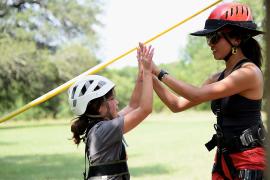Camp is getting ready to start and you have a myriad of choices of guidelines and tests for COVID-19 to keep your campers safe. You understand what the rules and tests are, but do you know how to run a safe COVID-19 testing program?
An optimal COVID-19 testing strategy should be as robust as possible without adding fear or inconvenience to your campers or your staff. There are many components and questions you will need to evaluate when determining the favored testing solution for your camp. Setting the proper groundwork will enable you to have a customized and safe testing program.
The first thing you need to ask yourself is who will be your COVID-19 testing laboratory partner? Do they offer all necessary types of COVID-19 tests and the knowledge and capabilities to develop, customize, and run a COVID-19 testing program for your camp from start to finish?
Some questions to ask your laboratory COVID-19 testing partner:
- Do you offer rapid antigen testing, polymerase chain reaction (PCR) testing, and antibody testing if needed for different testing strategies?
- Can you do pooled testing?
- Do you have neutralizing antibody testing for our staff who have been vaccinated?
- Do you offer on-site testing with certified health professionals, fast turnaround times, and standardized set up?
- Do you provide personal protective equipment such as masks, gloves, and face shields?
- Can you train our employees on all aspects of COVID-19 testing?
- Does your lab have a mobile Clinical Laboratory Improvement Amendments (CLIA) laboratory for on-site mobile testing and results if needed?
- Does your laboratory understand the regulations and the necessary reporting for the county, city, and state?
- Do you have the data management and reporting capabilities for reporting results to our campers/parents/staff and appropriate agencies?
The second thing you need to ask yourself is who should we be testing? Each camp will have a different strategy, but you know who you should be testing and how often based on local and Centers for Disease Control and Prevention (CDC) guidelines:
- Are you testing essential camp employees?
- Are you testing vaccinated individuals?
- Are you testing remote employees?
- Are you testing campers at home prior to opening day?
- Are you testing campers daily?
- Are you testing high-risk individuals?
- Are you testing on-site vendors that enter the camp?
- How often should all required individuals be tested?
The third question you should ask yourself should be who will be performing the testing?
- Should the testing be self-administered?
- Should/can camp staff perform the testing?
- Do we need trained individuals or certified healthcare workers to assist?
- Does our laboratory testing provider provide this service on-site?
The final question should be what type of testing program is most appropriate for our camp? Each camp may need a customized approach to ensure the safety of your staff and campers and to meet any state-specific test guidelines.
In a pre-arrival diagnostic testing program, campers are tested for an active infection by PCR testing within 72 hours (about three days) of arriving to camp. The PCR test should be a test that is Food and Drug Administration (FDA) Emergency Use Authorized (EUA) and is listed on the FDA site, resulting within 24 hours to ensure that results are available within the 72-hour window ahead of arrival. If a camper has tested positive by an EUA PCR test, the camper should stay at home and practice the CDC’s Home Isolation Recommendations. The camper may return to camp when they meet the CDC’s recommendations to discontinue home isolation: once 10 days have passed since the onset of symptoms or a positive test; after at least 24 hours with no fever without the use of fever-reducing medications; and once other COVID-19 symptoms are improving.
In a surveillance testing program, campers and essential employees such as staff and counselors test routinely using rapid (15-minute processing time) antigen testing to identify whether an individual potentially has an active infection. Specific to this program, any test that reads out as positive is considered “presumptively positive,” meaning the individual’s test result on the antigen test must be followed with a confirmatory FDA EUA PCR test to determine whether the camper or staff is a true positive. While waiting for the return of the results of the PCR test, which should be within 24 hours, the camper/individual would be required to isolate away from others or be sent home. By pairing rapid antigen and PCR testing in this surveillance model, campers and staff may also more quickly identify potential outbreaks and have plans in place to address them proactively, rather than reactively.
What kind of program are you going to need? Do you and your testing partner know which one is most appropriate for your camp, or is it a combination of testing programs? If there is an outbreak, can you pivot your program quickly?
Be prepared and find answers to these questions before you lay out your COVID-19 testing program for your camp. Or, if you want, find a COVID-19 laboratory testing partner to do it all for you.
This sponsored blog is provided by Biodesix. Biodesix offers the WorkSafe Covid-19 Testing Program which includes FDA Emergency Use Authorized (EUA) antigen, antibody, and PCR COVID-19 tests along with a full spectrum of customizable implementation services to support COVID-19 testing programs. The company supports schools, employers, sports teams, and hospitals in customizing and implementing COVID-19 testing strategies. For more information visit our website, email [email protected], or call (866) 432-5930.
Periodically, the American Camp Association (ACA) makes timely and relevant information about products and services available to its members so they can make informed decisions for their camps. However, the ACA does not endorse products, services, or companies.
The views and opinions expressed by contributors are their own and do not necessarily reflect the views of the American Camp Association or ACA employees.




